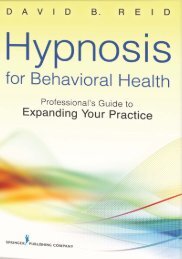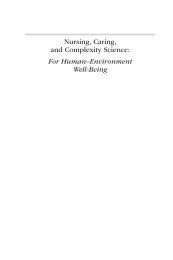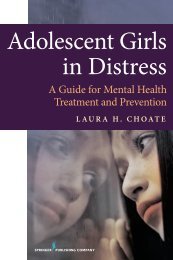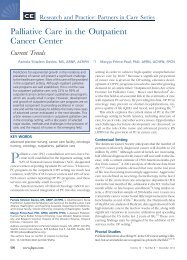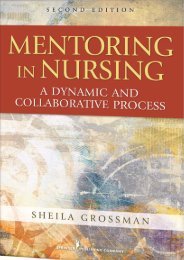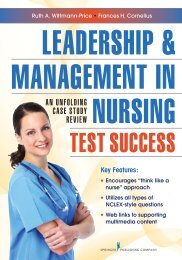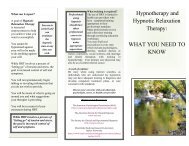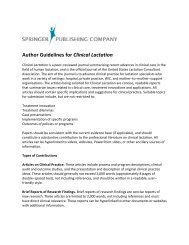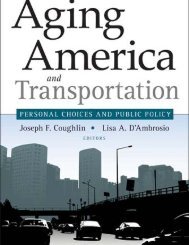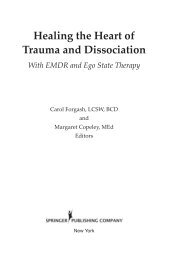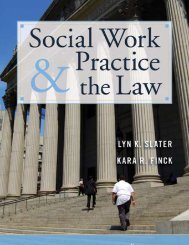Expertise in nursing practice : caring, clinical judgment - Springer ...
Expertise in nursing practice : caring, clinical judgment - Springer ...
Expertise in nursing practice : caring, clinical judgment - Springer ...
You also want an ePaper? Increase the reach of your titles
YUMPU automatically turns print PDFs into web optimized ePapers that Google loves.
Chapter 1 The Relationship of Theory and Practice <strong>in</strong> the Acquisition of Skill 21<br />
structure their worlds. S<strong>in</strong>ce mean<strong>in</strong>gs are shared, one can also select<br />
and describe typical cases, lay<strong>in</strong>g out what matters and what possibilities<br />
are opened and closed <strong>in</strong> typical situations. Qualitative dist<strong>in</strong>ctions can<br />
then be made between more and less successful <strong>in</strong>terventions. One can<br />
also lookatthe stages through which car<strong>in</strong>g skills develop and formulate<br />
maxims to aid beg<strong>in</strong>ners. Yet, the nurse, who is an expert <strong>in</strong> car<strong>in</strong>g, knows<br />
that she cannot be guided by pr<strong>in</strong>ciples or any pseudosciences of the<br />
psyche but must enter <strong>in</strong>to the situation of the patient and be guidedby<br />
participation and <strong>in</strong>tuition.<br />
In this doma<strong>in</strong>, there can be no cl<strong>in</strong>ical knowledge, as Plato would<br />
def<strong>in</strong>e it, but there can and must be cl<strong>in</strong>ical understand<strong>in</strong>g. Thus, <strong>in</strong><br />
car<strong>in</strong>g, as <strong>in</strong> the case ofthe application of medical theory, one f<strong>in</strong>ds a<br />
<strong>practice</strong> requir<strong>in</strong>g <strong>in</strong>volvement for which there can be no theory. However,<br />
there is an important difference between the treatment of disease<br />
and the care ofillness. In thecase ofapply<strong>in</strong>g the general pr<strong>in</strong>ciples of<br />
medic<strong>in</strong>e, the nurse must be <strong>in</strong>volved <strong>in</strong>the activity of us<strong>in</strong>g the technology<br />
and must learn to read the bodily signs of disease, not,ofcourse,<br />
as cues for the application of rules but as patterns that solicit the appropriate<br />
<strong>in</strong>tuitive response. The nurse, however, is not only <strong>in</strong>volved<strong>in</strong>the<br />
activity of beg<strong>in</strong>n<strong>in</strong>g to bear the science and technology of medic<strong>in</strong>e on<br />
aspecific body with a specific disease but is also <strong>in</strong> car<strong>in</strong>g. In car<strong>in</strong>g, the<br />
nurse must be able to take onthe perspective ofthe patient and make<br />
peace with the situation and its suffer<strong>in</strong>g <strong>in</strong> order to be touched bythe<br />
situation of a fellow human be<strong>in</strong>g and have the tacttoenable that person<br />
to surmount the patient’s illness. Only by comb<strong>in</strong><strong>in</strong>g both technological<br />
and existential skills <strong>in</strong> their unique <strong>practice</strong> is the nurse able to heal both<br />
the body and the person.<br />
Thus, nurs<strong>in</strong>g has an evenmore privileged place among Western skills<br />
than that of provid<strong>in</strong>g an outstand<strong>in</strong>g example ofthe essential place of<br />
<strong>practice</strong> and <strong>in</strong>tuition<strong>in</strong>atheoretical discipl<strong>in</strong>e. Nurs<strong>in</strong>g is also—and this<br />
constitutes its total uniqueness—a doma<strong>in</strong> show<strong>in</strong>g forth clearly that <strong>in</strong><br />
some human areas, there is no place at all for abstract,objective, universal<br />
theory nor for analytical rationality. Besides be<strong>in</strong>g the perfect model of<br />
a craft (techne), the car<strong>in</strong>g <strong>practice</strong>s of nurs<strong>in</strong>g provide a paradigm case<br />
of skills that have no theoretical component at all.<br />
COMMENTARY<br />
The Dreyfus model of cl<strong>in</strong>ical and ethical skill acquisition and formation<br />
of an expert is based onthe notion that experiential learn<strong>in</strong>g is essential for



